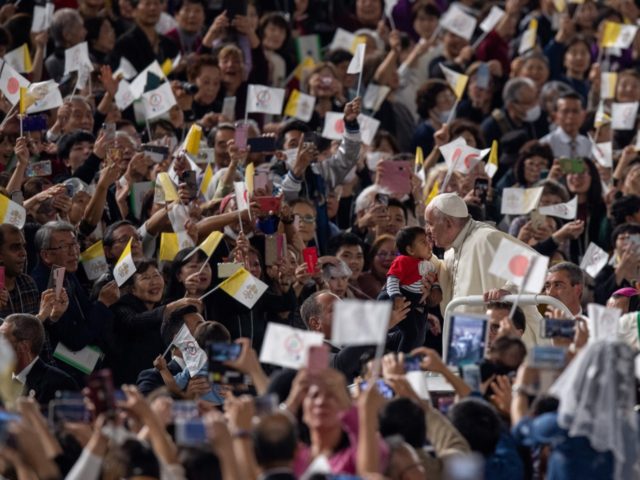Pope Francis told young people in Tokyo on Monday those who bully others are compensating for their own insecurities and weakness.
Replying to a boy named Leonardo, who shared his experiences of being bullied at school, the pope said that deep down, “bullies are afraid; they are cowards clothed in the appearance of strength.”
“The cruelest thing about bullying is that it hurts our spirit and our self-esteem at a time when we most need strength to accept ourselves and to be able to face new challenges in life,” Francis said. “Sometimes victims of bullying even blame themselves for being ‘easy’ targets. They can feel like failures, weak and worthless.”
“Paradoxically,” he continued, “it is the bullies who are the truly weak ones, because they think they can assert their own identity by hurting others. Sometimes they attack anyone they consider different, who represents something that threatens them.”
A person’s need to pick on those who are smaller or weaker is itself a sign of interior weakness, the pope proposed.
“When you see that someone has a need to hurt another, to bully another, to harass him, he is the weak one,” Francis said. “The bullied person is not the weak one, it is the one who bullies who is weak because he needs to feel big, to feel strong in order to feel like a person.”
The pope went on to suggest that young people themselves need to band together against bullying, since they are the ones who have the most effective “weapon” to effectively stop it.
“We must all unite against this culture of bullying, all together against this culture of bullying, and learn to say: Enough!” he said. “It is an epidemic for which you yourselves have the best medicine.”
“It is not enough for educational institutions or adults to use all the resources at their disposal to prevent this tragedy, but it is necessary that among you, among friends, among colleagues, you come together to say: ‘No! No bullying, no aggression,’” he said.
“The one who bullies is fearful, and fear is always the enemy of goodness, and therefore it is the enemy of love and peace,” he said.
The pope went on to reassert his conviction that all religions, and not only Christianity, preach love, tolerance, and mercy.
“The great religions, all the religions that each of us practice, teach tolerance, teach harmony, teach mercy; religions do not teach fear, division or conflict,” he said.
For Christians, inspiration comes from the life of Jesus, who knew what it was like to be bullied, he suggested.
“Looking at the life of Jesus allows us to find comfort, because Jesus himself knew what it meant to be despised and rejected, even to the point of being crucified,” Francis said. “He also knew what it was like to be a stranger, a migrant, somebody who was ‘different.’”
In a sense, the pope concluded, “Jesus was the most ‘marginalized,’ a marginalized man full of life to give.”

COMMENTS
Please let us know if you're having issues with commenting.